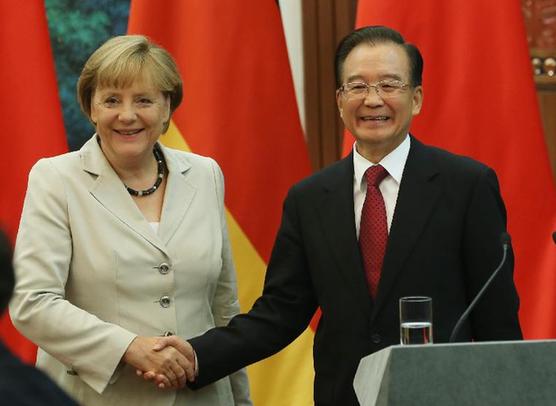How safe is an investment in European debt?
- By Catherine Wood
 0 Comment(s)
0 Comment(s) Print
Print E-mail China.org.cn, August 31, 2012
E-mail China.org.cn, August 31, 2012
|
|
|
Chinese Premier Wen Jiabao (R) shakes hands with German Chancellor Angela Merkel during a press conference at the Great Hall of the People in Beijing, capital of China, Aug. 30, 2012. [Xinhua] |
German Chancellor Angela Merkel arrived Thursday in Beijing to talk trade with Chinese President Hu Jintao and Premier Wen Jiabao as part of a two-day official visit. Some of the best and brightest executives in the German auto, chemical, and energy industries joined Merkel on the trip.
In an initial meeting Thursday, Wen and Merkel met to discuss normal trade agreements and fully brief the Chinese premier on continual European debt problems.
The early meeting comes amid trade tensions between the EU and China. European markets have raised allegations of dumping by Chinese solar panel manufacturers, citing an improperly subsidized Chinese energy sector. Allegations of dumping may hinder Chinese-European trade relations in subsequent quarters.
However, easing tensions in Chinese-European trade is not the only reason for Merkel's visit. Reports in Berlin have surfaced that Merkel wants to assure China that European debt is a "safe and good investment." But just how safe is European debt for China?
To be fair, the 'euro crisis' and conditions in Greece have changed a lot since March 2012, but they surely have not changed enough to be considered "safe and good investments."Just this past March, Chinese investments suffered as part of a deal to reduce the face value of Greek bonds by 53.5 percent, and optimism around European debt has not gone up since then. In April 2012, the IMF downgraded Greek debt to 'junk-bond' status. For international investors, European debt could be a lucrative but risky investment. However, these are generally not the type of bonds China wants to invest in.
In 2012, the value of the euro continued its downward trend against the yuan and other main world currencies, providing a less than stable outlook in the financial quarters to come. In order to argue that European debt is in fact a safe investment, Merkel will have to do some major convincing over the two days.
In order to make European debt safer, several EU policies will have to change. Although the EU has rigorous requirements for becoming a member nation, consequences for falling below these standards have not been enforced. Greece continues to weaken the integrity of the European Union and it is no secret that other nations are falling quickly behind. Spain, Cyprus, Ireland, and Portugal have all formally requested bailouts from the EU, with Spain and Cyprus requesting one this past summer. At present, the outlook for Europe seems to be looking worse, not better.
Furthermore, Europe has not adopted any unified approach to solving its debt crisis. Yesterday, a disagreement between Italy and Germany surfaced in Berlin over a discrepancy in the euro zone bailout fund. Merkel decided against granting the ESM's (European Stability Mechanism's) request for a banking license. The move would have started an organization to provide the euro zone with assistance in times of financial difficulty. Despite the decision, Italian Prime Minister Mario Monti reinforced that the ESM is still a valid option to solving the debt crisis and should be called upon in the future. From the prospective of an outside observer, there seems to be a lot of European banter on a solution but very little progress in finding one.
Mario Draghi, European Central Bank president, dreams of a unified debt solution to the Euro Crisis. He said in yesterday's Die Ziet (Germany's National Newspaper), "Countries have to live within their means...banks have to conform to the highest regulatory standards and focus on serving the real economy."
European debt will be a safe investment eventually, but for now calling it "risky" may be an understatement. Much like the U.S. financial crisis of 2008, things will get worse before they get better. In order to improve the ratings of its debt, the EU will need to take serious actions to keep its member-nations afloat. This might include extreme options like asking Greece (and other nations who do not meet membership standards) to exit from the Euro until all membership standards are met. We will also need to see a unified, solid plan to fix the Euro crisis. With an investment, you want to know what you are getting. Rules are rules and if they are broken, consequences should be enacted to increase investor confidence in the European Union.
Catherine Wood is a freelance writer currently based in Beijing.
Opinion articles reflect the views of their authors, not necessarily those of China.org.cn







Go to Forum >>0 Comment(s)